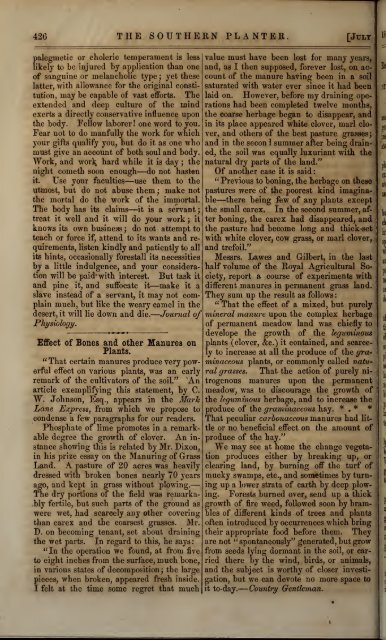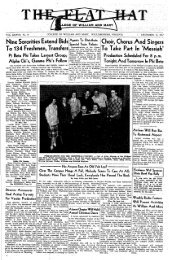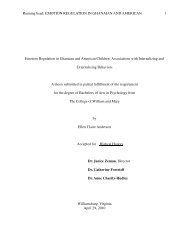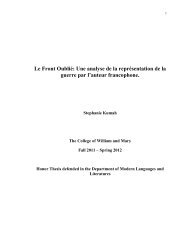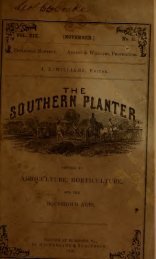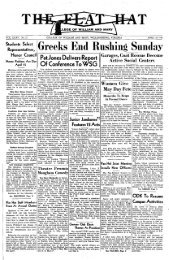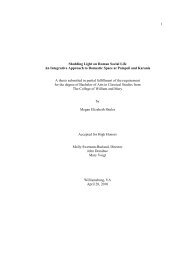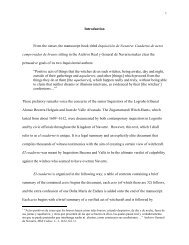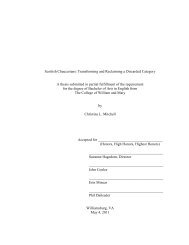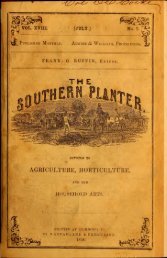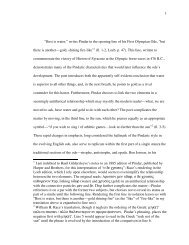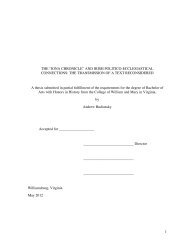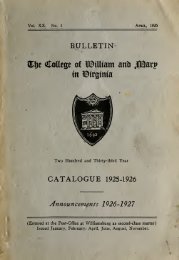Southern planter - The W&M Digital Archive
Southern planter - The W&M Digital Archive
Southern planter - The W&M Digital Archive
You also want an ePaper? Increase the reach of your titles
YUMPU automatically turns print PDFs into web optimized ePapers that Google loves.
426 THE SOUTHERN PLANTER. [July<br />
palegmetic or choleric temperament is less<br />
likely to be injured by application than one<br />
of sanguine or melancholic type ;<br />
yet these<br />
latter, with allowance for the original constitution,<br />
may be capable of vast efforts. <strong>The</strong><br />
extended and deep culture of the mind<br />
exerts a directly conservative influence upon<br />
the body. Fellow laborer ! one word to you.<br />
Fear not to do manfully the work for which<br />
your gifts qualify you, but do it as one who<br />
must give an account of both soul and body.<br />
Work, and work hard while it is day ; the<br />
night cometh soon enough—do not hasten<br />
it. Use your faculties—use them to the<br />
utmost, but do not abuse them ; make not<br />
the mortal do the work of the immortal.<br />
<strong>The</strong> body has its claims—it is a servant<br />
treat it well and it will do your work; it<br />
knows its own business ; do not attempt to<br />
teach or force if, attend to its wants and requirements,<br />
listen kindly and patiently to all<br />
its hints, occasionally forestall its necessities<br />
by a little indulgence, and your considera-<br />
tion will be paid with interest. But task it<br />
and pine it, and suffocate it—make it a<br />
slave instead of a servant, it may not complain<br />
much, but like the weary camel in the<br />
desert, it will lie down and die. Journal of<br />
Physiology.<br />
Effect of Bones and other Manures on<br />
Plants.<br />
u That certain manures produce very pow-<br />
erful effect on various plants, was an early<br />
remark of the cultivators of the soil." An<br />
article exemplifying this statement, by C.<br />
W. Johnson, Esq., appears in the Mark<br />
Lane Express, from which we propose to<br />
condense a few paragraphs for our readers.<br />
Phosphate of lime promotes in a remark-<br />
able degree the growth of clover. An instance<br />
showing this is related by Mr. Dixon,<br />
in his prize essay on the Manuring of Grass<br />
Land. A pasture of 20 acres was heavily<br />
dressed with broken bones nearly 70 years<br />
ago, and kept in grass without plowing.<br />
<strong>The</strong> dry portions of the field was remarkably<br />
fertile, but such parts of the ground as<br />
were wet, had scarcely any other covering<br />
than carex and the coarsest grasses. Mr.<br />
D. on becoming tenant, set about draining<br />
the wet parts. In regard to this, he says:<br />
"In the operation we found, at from five<br />
to eight inches from the surface, much bone,<br />
in various states of decomposition ; the large<br />
pieces, when broken, appeared fresh inside.<br />
I felt at the time some regret that much<br />
value must have been lost for many years,<br />
and, as I then supposed, forever lost, on, account<br />
of the manure having been in a soil<br />
saturated with water ever since it had been<br />
laid on. However, before my draining operations<br />
had been completed twelve months,<br />
the coarse herbage began to disappear, and<br />
in its place appeared white clover, marl clo-<br />
ver, and others of the best pasture grasses;<br />
and in the secon 1 summer after being drain-<br />
ed, the soil was equally luxuriant with the<br />
natural dry parts of the land."<br />
Of another case it is said<br />
" Previous to boning, the herbage on these<br />
pastures were of the poorest kind imaginable—there<br />
being few of any plants except<br />
the small carex. In the second summer, after<br />
boning, the carex had disappeared, and<br />
the pasture had become long and thick-set<br />
with white clover, cow grass, or marl clover,<br />
and trefoil."<br />
Messrs. Lawes and Gilbert, in the last<br />
half volume of the Royal Agricultural Society,<br />
report a course of experiments with<br />
different manures in permanent grass land.<br />
<strong>The</strong>y sum up the result as follows<br />
" That the effect of a mixed, but purely<br />
mineral manure upon the complex herbage<br />
of permanent meadow land was chiefly to<br />
develope the growth of the leguminous<br />
plants (clover, &c.) it contained, and scarcely<br />
to increase at all the produce of the graminaceous<br />
plants, or commonly called natural<br />
grasses. That the action of purely nitrogenous<br />
manures upon the permanent<br />
meadow, was to discourage the growth of<br />
the leguminous herbage, and to increase the<br />
produce of the graminaceous hay. * . * *<br />
That peculiar carbonaceous manures had lit-<br />
tle or no beneficial effect on the amount of<br />
produce of the hay."<br />
We may see at home the change vegetation<br />
produces either by breaking up, or<br />
clearing land, by burning off the turf of<br />
mucky swamps, etc., and sometimes by turning<br />
up a lower strata of earth by deep plowing.<br />
Forests burned over, send up a thick<br />
growth of fire weed, followed soon by bram-<br />
bles of different kinds of trees and plants<br />
often introduced by occurrences which bring<br />
their appropriate food before them. <strong>The</strong>y<br />
are not "spontaneously" generated, but grow<br />
from seeds lying dormant in the soil, or car-<br />
ried there by the wind, birds, or animals,<br />
and the subject is worthy of closer investi-<br />
gation, but we can devote no more space to<br />
it to-day.— Country Gentleman.


